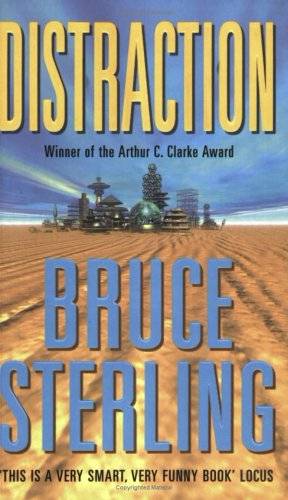

Distraction
by Bruce Sterling
Bruce Sterling's latest, longest, most rigorously imagined portrait of 21st-century American life, Distraction, is now available, and that is very good news. Anyone with more than a passing interest in science fiction anyone who appreciates fiction that illuminates the relationship between the vast, impersonal forces of social change and the increasingly beleaguered life of the individual is advised, without reservation, to read this book. Distraction opens during the election year of 2044 and drops us immediately into the hyperactive universe of Oscar Valparaiso, a fixer and political spin artist who has just conducted his first successful senatorial campaign and has been "rewarded" with a patronage position on the Senate Science Committee. His new job sends him to the backwaters of East Texas to investigate conditions in a federally funded research institute called the Collaboratory. Once there, he uncovers a long-standing history of kickbacks, corruption, and old-fashioned political featherbedding. Oscar's attempts to introduce an element of reform into this closed society lead directly to the two relationships that stand at the heart of the novel. One is a romantic liaison between Oscar and with Dr. Greta Penninger, a Nobel Prize-winning pioneer in the increasingly prominent field of neural studies. The other is a protracted, no-holds-barred conflict with the governor of Louisiana, a classic southern demagogue named Etienne (Green Huey) Hugelet, who has his own undisclosed interests in the products of theCollaboratory'sresearch. As in most Sterling novels, the plot is designed to support an immensely detailed vision of a near-future society that is at once familiar and deeply strange. In the America of Distraction as in its real-world analogue, the fractured, surreal societies of post-communist Russia the center has long since ceased to hold. The ongoing greenhouse effect has led to disastrous new weather patterns. Ocean levels are rising. Entire species are disappearing at a record rate. On the international front, the Chinese have won a decisive victory in their "economic war" with the United States by the simple expedient of publishing all proprietary American software over the Internet. In the aftermath of that defeat, chaos and fragmentation reign. Sixteen distinct political parties now exist. Emergency Committees have usurped the constitutionally created branches of government. The military can no longer pay its bills. Cities have become privately owned entities. The unemployed underclass has evolved into competing nomadic hordes that are often better organized than the government itself. The country, as one character puts it, "is up on blocks," desperately seeking its lost center; in need of a miracle capable of making "laws out of chaos, justice out of noise, and meaning out of total distraction." No one is better than Sterling at conveying the feel of day-to-day life in a complex, heavily networked, rapidly unraveling society. In Oscar Valparaiso, genetically suspect master of a bizarre 21st-century realpolitik, he has found the perfect vehicle for interpreting and illuminating that society. Distraction is a funny, frenetic, beautifully ornamented portrait of a world in crisis, the clear product of a distinctive talent working at the top of his very considerable form. Bill Sheehan
Release Date:
August 31, 2000

